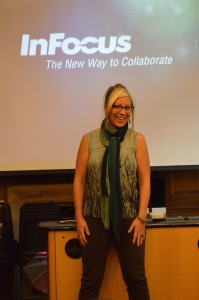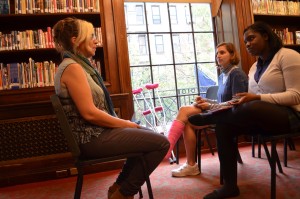On November 10th, Hewitt’s 11th and 12th grade English students took a morning off to gather in the library and listen to a conversation with writer, professor, and radio commentator, Rachel Louise Snyder. Ms. Snyder is the author of Fugitive Denim: A Moving Story of People and Pants in the Borderless World of Global Trade and What We’ve Lost is Nothing: A Novel. She is also a contributor to The New Yorker, The New York Times, The Chicago Tribune, and other publications. Ms. Snyder lived in Cambodia for six years and now resides in Washington D.C. and is a professor at American University.

The Hewitt Times: Where do you get your inspiration for your stories?
Rachel Louise Snyder: Wherever there is a mystery. I want to unravel a mystery to some extent–whether it is fiction or nonfiction.
HT: What was is like to be an author in Cambodia? What were the stories that you heard there?
RS: Cambodians don’t have a strong literary tradition. It was not interesting to them that I was a writer, necessarily. Also, it was frustrating because we call Cambodia “the land of no.” Even if you were trying to write a story that seemed positive, they don’t have a history there of the media being a public service. They were always like, “No,” you can’t interview me.
It was interesting to me to talk to people who had wildly different lives than I did. One of the reasons I like to travel is because there is no mystery there of why you do things because it’s just in our culture; whereas, in Cambodia, there is a new mystery every day to unravel. I loved it. I did a book reading there for the expats after my first book came out, and it was exciting for everybody because it’s not a place that you would stop on a book tour. I had tons more people there than I would have in New York because there are lots of [book tours] in New York. I think any opportunity you get to disembark from the familiar will be a worthwhile opportunity.
HT: As a professor, why do you like teaching creative writing as opposed to literature?
RS: The separation between the two is important to me because I want to leave the interpretation of anything up to a reader. I’m interested in the craft of how something comes to be, not so much the interpretation of what it is. I’m interested in the connections that occur organically on a page as opposed to us foisting them there ourselves.

HT: Does working and living in Washington D.C., a city with active political life, affect your writing ?
RS: It really doesn’t. It’s funny because when I talk to my relatives in L.A., and I talk about how L.A. and D.C. are sister cities in the sense that people have one association with that place from the outside, but when you’re living inside of it, you can live an entirely different life. I don’t live near the mall, my friends are all writers and artists. It affects me very little; you can carve out your own space wherever you are. I do have this social justice approach to my writing, though.
HT: What piece of advice would you give aspiring writers?
RS: I would say write every day and the best question you can ask during an interview is: What’s controversial about this? I would also say don’t ever accept your first interpretation of anything. I wrote a chapter in my first book which was about globalization. I was in a Chinese factory, and I was with a group of people from an organization who were teaching a two hour class once a week for workers in the factory. In the session I sat in on, the workers learned about the proper way to ask a girl to dance, about their oily T-zones, and how to talk to boys. For months, I called the organization’s headquarters and Chinese scholars at Berkeley, and no one knew why they taught that. Then, it finally hit me that these workers are teenagers who are leaving their rural homes for the first time, living in dorms with no parental supervision, so they don’t know how to talk to boys, ask girls out, learn how to take care of their own T-zones. Actually, it was my own bias on what they should be learning that I was bringing to the table. It took me two months to realize that. The mulling is so important. Never take one interpretation of anything.